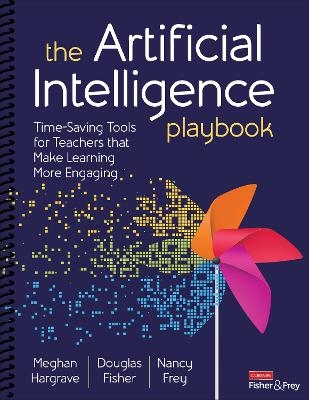
The Artificial Intelligence Playbook
Corwin Press Inc (Verlag)
978-1-0719-4963-4 (ISBN)
Busy educators need tools that support their planning and provide them with more time with students. While Artificial Intelligence (AI) has emerged as a promising solution, it can only help if we’re willing to learn how to use it in ways that improve upon what we already do well. The Artificial Intelligence Playbook: Time Saving Tools that Make Learning More Engaging is here to empower teachers to explore AI’s potential and discover practical ways to implement it to enhance their planning and instruction. Two chapters and 6 "Educator Functions" guide teachers step-by-step through how to purposely use AI to:
Compose Writing Prompts and Avoid Plagiarism
Manage Content
Foster Student Engagement
Meet Students’ Instructional Needs
Assess Student Learning
Continue Lifelong Learning
Though AI has the potential to reduce workload for educators, it will never replace teachers. Your connection with students is irreplaceable—and greatly impacts their learning. Consider AI a valuable tool that provides you with more time to build and sustain those vital relationships with students and that can assist them in learning at the very same time.
Meghan Hargrave is an experienced educator, with over 15 years in the field. After being a teacher leader in the classroom, she moved into education coaching and consulting where she supports hundreds of K-12 schools and districts worldwide. Her work has always focused on important instructional shifts in education and practical ways the educators she supports can embrace these shifts effectively, which has included the integration of Artificial Intelligence tools in the classroom. She is ChatGPT, GoogleAI, and AI for Education certified in addition to working closely with thousands of educators on how to implement these tools in the classroom. She is an international presenter, has taught preservice teachers at Columbia University’s Teachers College, regularly contributes to popular educational publications, and is known for sharing innovative and effective classroom strategies via social media @letmeknowhowitgoes. Douglas Fisher is professor and chair of educational leadership at San Diego State University and a leader at Health Sciences High and Middle College. Previously, Doug was an early intervention teacher and elementary school educator. He is a credentialed teacher and leader in California. In 2022, he was inducted into the Reading Hall of Fame by the Literacy Research Association. He has published widely on literacy, quality instruction, and assessment, as well as books such as Welcome to Teaching, PLC+, Teaching Students to Drive their Learning, and Student Assessment: Better Evidence, Better Decisions, Better Learning. Nancy Frey is professor of educational leadership at San Diego State University and a leader at Health Sciences High and Middle College. Previously, Nancy was a teacher, academic coach, and central office resource coordinator in Florida. She is a credentialed special educator, reading specialist, and administrator in California. She is a member of the International Literacy Association’s Literacy Research Panel. She has published widely on literacy, quality instruction, and assessment, as well as books such as The Artificial Intelligences Playbook, How Scaffolding Works, How Teams Work, and The Vocabulary Playbook.
Introduction
Part I: Essentials
Chapter 1: Getting to Know AI
Chapter 2: Writing Prompts and Avoiding Plagiarism
Part 2: Why & How to Use AI
Educator Function #1: Managing Content
Educator Function #2: Fostering Student Engagement
Educator Function #3: Meeting Students’ Instructional Needs
Educator Function #4: Assessing Student Learning
Educator Function #5: Providing Effective Feedback
Educator Function #6: Lifelong Learning
Conclusion
| Erscheinungsdatum | 24.04.2024 |
|---|---|
| Verlagsort | Thousand Oaks |
| Sprache | englisch |
| Maße | 215 x 279 mm |
| Gewicht | 470 g |
| Themenwelt | Schulbuch / Wörterbuch ► Unterrichtsvorbereitung |
| Informatik ► Theorie / Studium ► Künstliche Intelligenz / Robotik | |
| Sozialwissenschaften ► Pädagogik | |
| ISBN-10 | 1-0719-4963-2 / 1071949632 |
| ISBN-13 | 978-1-0719-4963-4 / 9781071949634 |
| Zustand | Neuware |
| Informationen gemäß Produktsicherheitsverordnung (GPSR) | |
| Haben Sie eine Frage zum Produkt? |
aus dem Bereich


